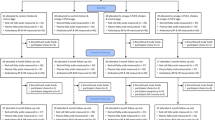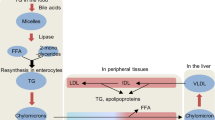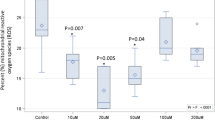Abstract
Consumption of n-6 polyunsaturated fatty acids greatly exceeds that of n-3 polyunsaturated fatty acids. The n-6 polyunsaturated fatty acid arachidonic gives rise to the eicosanoid family of inflammatory mediators (prostaglandins, leukotrienes and related metabolites) and through these regulates the activities of inflammatory cells, the production of cytokines and the various balances within the immune system. Fish oil and oily fish are good sources of long chain n-3 polyunsaturated fatty acids. Consumption of these fatty acids decreases the amount of arachidonic acid in cell membranes and so available for eicosanoid production. Thus, n-3 polyunsaturated fatty acids act as arachidonic acid antagonists. Components of both natural and acquired immunity, including the production of key inflammatory cytokines, can be affected by n-3 polyunsaturated fatty acids. Although some of the effects of n-3 fatty acids may be brought about by modulation of the amount and types of eicosanoids made, it is possible that these fatty acids might elicit some of their effects by eicosanoid-independent mechanisms. Such n-3 fatty acid-induced effects may be of use as a therapy for acute and chronic inflammation, and for disorders which involve an inappropriately activated immune response.
This is a preview of subscription content, access via your institution
Access options
Subscribe to this journal
Receive 12 print issues and online access
$259.00 per year
only $21.58 per issue
Buy this article
- Purchase on Springer Link
- Instant access to full article PDF
Prices may be subject to local taxes which are calculated during checkout
Similar content being viewed by others
Author information
Authors and Affiliations
Corresponding author
Rights and permissions
About this article
Cite this article
Calder, P., Grimble, R. Polyunsaturated fatty acids, inflammation and immunity. Eur J Clin Nutr 56 (Suppl 3), S14–S19 (2002). https://doi.org/10.1038/sj.ejcn.1601478
Published:
Issue Date:
DOI: https://doi.org/10.1038/sj.ejcn.1601478
Keywords
This article is cited by
-
Analysis of fecal microbiome and metabolome changes in goats with pregnant toxemia
BMC Veterinary Research (2024)
-
Oxidative balance score and risk of cancer: a systematic review and meta-analysis of observational studies
BMC Cancer (2023)
-
Association between systemic omega-3 polyunsaturated fatty acid levels, and corneal nerve structure and function
Eye (2023)
-
Comprehensive proteomic analysis reveals omega-3 fatty acids to counteract endotoxin-stimulated metabolic dysregulation in porcine enterocytes
Scientific Reports (2023)
-
Role of omega-3 polyunsaturated fatty acids, citrus pectin, and milk-derived exosomes on intestinal barrier integrity and immunity in animals
Journal of Animal Science and Biotechnology (2022)



